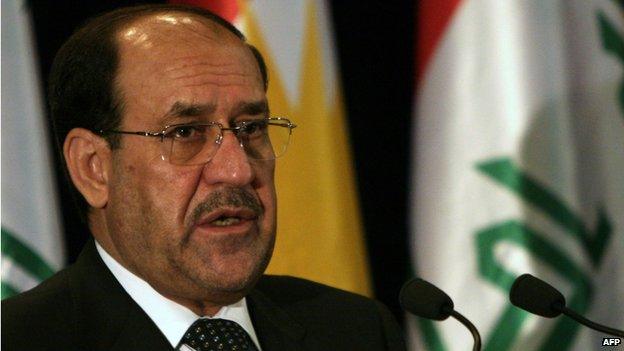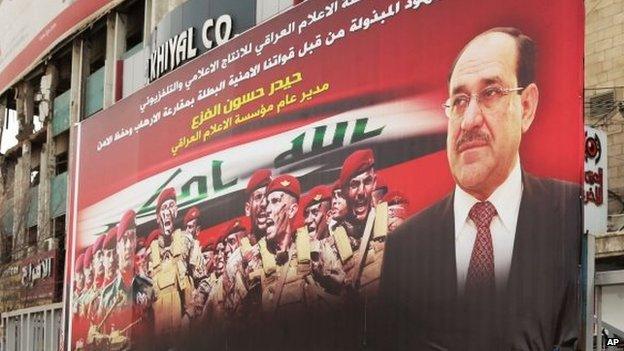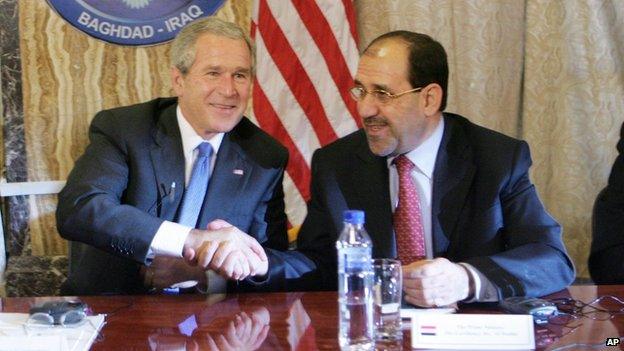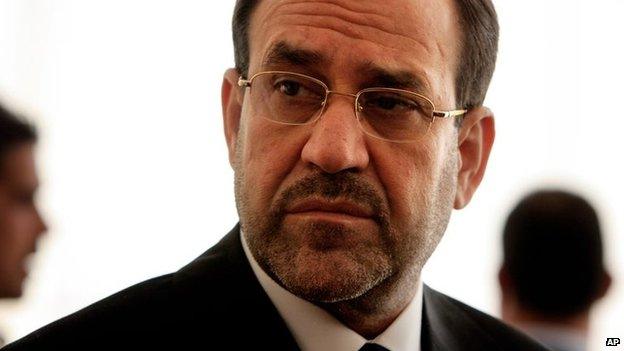Profile: Nouri Maliki
- Published

Nouri Maliki was relatively unknown internationally until he became prime minister
Iraqi Prime Minister Nouri Maliki first came to power in 2006, at a time when sectarian violence was threatening to tear the country apart.
Mr Maliki resisted pressure from Washington to request an extension of US troop presence in the country, and presided over the formal end of the US military presence in Iraq.
However, despite his alliance narrowly winning the 2014 parliamentary election, he has struggled to contain a new tide of violence which has seen several cities slip from Iraqi government control, and has suffered shrinking support from Sunnis and Kurds.
He was also forced to defend himself from accusations that he has used the judiciary to silence and imprison political rivals.
In August 2014, after months of political infighting, new President Fuad Masum asked MP Haider al-Abadi to form a new government, despite Mr Maliki's protestations that the move was "unconstitutional".
Self-imposed exile
Nouri Mohammed Hassan Maliki was born near the Iraqi town of Hilla in July 1950. He has a master's degree in Arabic literature and is married with four daughters and one son.
His grandfather, Mohammed Hassan Abul Mahasin, was a poet and rebel fighter who opposed the British occupation of Iraq in the 1920s.
He is widely seen as the inspiration for Mr Maliki's strong nationalist ideals and his decision to join the Shia Islamist Dawa (Call) party as a university student in Baghdad in the 1970s.
Despite Dawa's Islamist roots, Mr Maliki sought to position himself as a strong and unifying leader in post-Saddam Iraq after coming to power in 2006.
However, since the 2010 elections Mr Maliki has been accused of abandoning a consensus-building strategy in favour of concentrating power among his mostly Shia allies. He has also become more closely allied with Iran over issues such as the conflict in Syria.
Return from exile
Mr Maliki returned to Iraq from exile after the US-led invasion in 2003 that overthrew Saddam Hussein and Dawa soon emerged as a major political force - with Mr Maliki among its vanguard.

Mr Maliki has struggled to contain a new tide of violence led by Islamist militants
He served as a spokesman for the party as well as for the broader coalition of Shia parties, the United Iraqi Alliance (UIA), which won the most seats in legislative elections in December 2005. He was relatively unknown before being nominated for the post of prime minister in 2006.
Mr Maliki helped draft the country's new constitution and was a member of a committee, set up by the US, tasked with purging Iraq of its Baathist legacy.
The work of the committee attracted criticism for apparently extending its crackdown to officials that had been Baath Party members.
Turbulent times
In 2007, Mr Maliki authorised a surge in US troop numbers that targeted al-Qaeda affiliated Sunni militants and led the 2008 campaign against Shia militias loyal to the radical cleric, Moqtada Sadr.

Mr Maliki had to work closely with the US during his early years in power
Under fire from his Shia allies and under pressure to reconcile with Iraq's Sunni community, he split from the UIA in early 2009 and formed the broader-based State of Law coalition.
The alliance campaigned on a platform of a unified Iraq in the March 2010 elections, but lost by a mere two seats to the mostly Sunni-backed al-Iraqiyya alliance of former Prime Minister Iyad Allawi.
In the months of deadlock that followed the poll, Mr Maliki was accused of turning to Tehran to help rebuild his power base and remain prime minister. The support of Moqtadr Sadr's bloc - reportedly the result of pressure from the Iranian government - was crucial.
Fragile coalition
After nine months of tortuous negotiations, Mr Maliki eventually formed a fragile government which included members of the al-Iraqiyya bloc.
However, the government quickly unravelled when, after the withdrawal of US troops, arrest warrants were issued for a senior member of al-Iraqiyya, Vice-President Tariq al-Hashemi.
Mr Hashemi, Iraq's most senior Sunni Arab politician, was accused of funding attacks on government and security officials during Iraq's bloody insurgency. He was sentenced to death in absentia in September 2012 but has since sought refuge in Turkey.
Mr Maliki denied that the charges against Mr Hashemi were politically motivated.
Militant insurgency
Since 2012, Mr Maliki has faced both popular protests and an increasingly violent insurgency, led by groups fighting for an "Islamic state" in the region.
He has struggled to confront new militant groups operating across the Syria-Iraq border.

He has denied using the judiciary to silence his opponents
One of the biggest groups, the Islamic State (formerly known as Isis), pushed Iraqi government forces out of several cities in the north and east of the country. Large parts of Anbar province had already been under the control of al-Qaeda-inspired militants for several months.
Mr Maliki has accused Saudi Arabia of being behind much of the unrest.
Political survival
Many Iraqis accused Mr Maliki of nepotism and mismanagement of Iraq's vast oil wealth. Both of his sons-in-law worked for his office and his son Ahmed was head of his security. Many parts of Iraq have remained poor and undeveloped during his time in office.
Despite these difficulties, his State of Law coalition won the most votes in the last parliamentary elections in April 2014, and Mr Maliki made clear his desire to serve a third term as prime minister.
However, there followed months of political infighting as parliament refused to give him a third term and he lost the backing of the US.
- Published11 November 2010